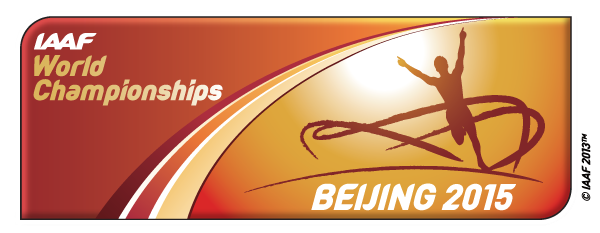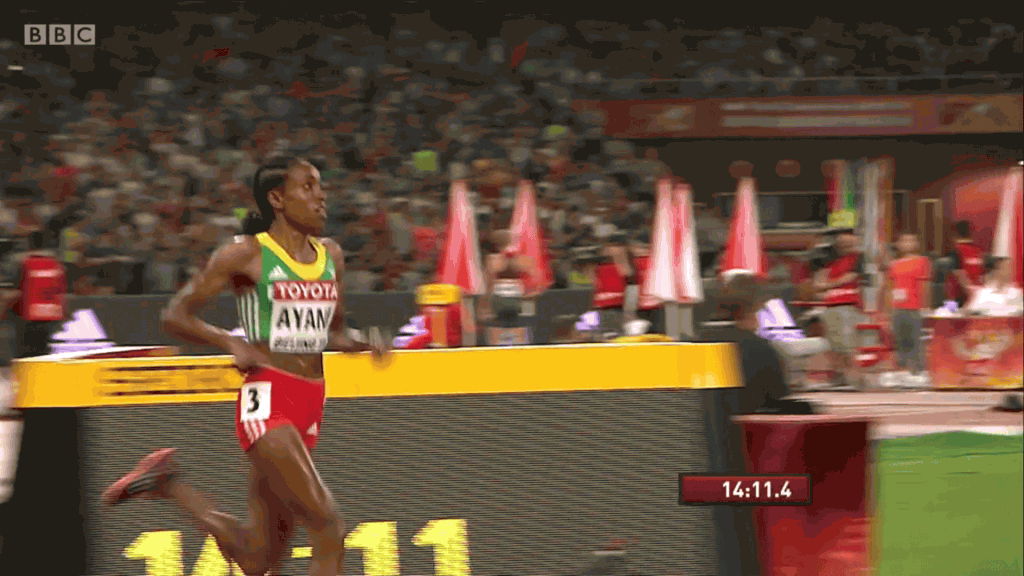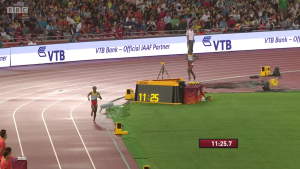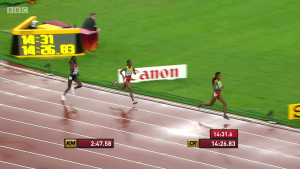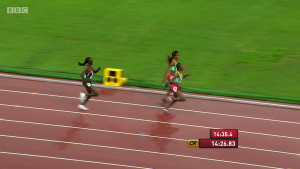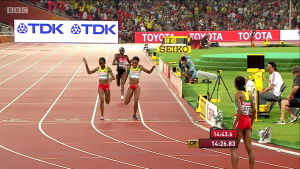Almaz Ayana Does the Unthinkable and Runs Away From Genzebe Dibaba With an 8:19 Final 3k
Ayana’s Last 3000 Of 8:19.91 Is 6th-Fastest 3000 In History; Dibaba Says She Was Bothered By A Foot Injury
by LetsRun.com
August 30, 2015
BEIJING – There is a reason why they run the race.
After her sensational 1:56.9 close to win the women’s 1500 on Tuesday, most pundits (including ourselves*) had already anointed Genzebe Dibaba as the champion of the women’s 5000. But Dibaba didn’t become the first woman to complete the 1500/5000 double at Worlds or the Olympics. The winner, in a rout, was fellow Ethiopian Almaz Ayana in a championship-record 14:26.83 as Ethiopia swept the medals.
The 23-year-old Ayana, who is the world’s 3rd-fastest women in history at 5000 (14:14.32), was truly sensational tonight. After a slow first 2km (6:06.27), Ayana hit the gas and absolutely destroyed the last 3k, running a mind-boggling 8:19.91 for her last 3000 to get the win going away.
The Race
Ayana went to the lead just before 7 laps remained and once in front there was no looking back. From 2k to 2400, she ran a 68.5, but remember she only took the lead halfway through that lap. Her next lap was a 67.6. She hit 3k in 8:55.63 meaning the third km was 2:49.36 – that’s world record pace (14:06 pace and the WR is 14:11.15), but Ayana was just getting started.
Her final 5 laps were (unofficial hand-timed):
66.00
65.03 (breaks Dibaba)
65.57
67.55
67.05
During those final 5 glorious laps, she ran her 4th km in 2:43.62 and her 5th in 2:47.58. Along the way, midway through the fourth-to-last lap, she did what many thought was unthinkable just 11 minutes ago when they were lining up on the start line – drop the world 1500 record holder Genzebe Dibaba, who is also #4 all-time at 5000 (14:15.41).
In the end, the final stats for Ayana’s close were staggering.
The last 3k leader-to-leader was 8:20.56 but for Ayana it was 8:19.91. That 8:19 time would place Ayana 6th all-time at 3000.
The Fastest 3000s in History
1 8:06.11 Wang Junxia China 1993
2 8:12.18 Qu Yunxia China 1993
3 8:16.50 Zhang Linli China 1993
4. 8:16.60i Genzebe Dibaba ETH 2014
5 8:19.78 Ma Liyan China 1993
6. 8:19.91 Almay Ayana ETH tonight
Her final 2000 of 5:31.20 actually is actually the 16th-fastest 2000 ever run.
Behind Ayana, Dibaba was was all alone for most of the second half of the race. By 3200 (9:28.43), she and Ayana had already put 25 meters on the rest of the field. At the bell, Dibaba had probably 30 meters on third and fourth. Even with 200 remaining, Dibaba had close to four seconds on third and fourth, 20-year-old Senbere Teferi of Ethiopia (14:36 pb) and the 31-year-old Kenyan champ Viola Kibiwot (14:33 pb). As those two battled it out for a medal, they started to gain a lot of ground on Dibaba, who was going absolutely nowhere on the final lap.
Did Dibaba know they were coming and was she saving something for the finish? Halfway down the homestretch Teferi came by Dibaba and for a brief moment there was no response. After about half a second, the comatose Dibaba responded and tried to put up a fight. However, the brief hesitation by Dibaba cost her as she wasn’t able to jump-start her motors enough to catch up to Teferi for silver as Teferi edged Dibaba, 14:44.07 to 14:44.14. Kibiwot ended up 4th for the second straight Worlds in 14:46.16. The final 100 in pictures (click for a larger image).
- Dibaba in 2nd
- Dibaba gets caught
- Dibaba settles for 3rd
Well behind them, former Florida State star Susan Kuijken of the Netherlands took top NAB honors (non-African-born) in 15:08.00, good for eighth place. US champion Nicole Tully was 13th in 15:27.42
| POS | BIB | ATHLETE | COUNTRY | MARK | |
|---|---|---|---|---|---|
| 1 | 337 | Almaz AYANA |  ETH ETH |
14:26.83 | CR |
| 2 | 352 | Senbere TEFERI |  ETH ETH |
14:44.07 | |
| 3 | 342 | Genzebe DIBABA |  ETH ETH |
14:44.14 | |
| 4 | 563 | Viola Jelagat KIBIWOT |  KEN KEN |
14:46.16 | |
| 5 | 559 | Mercy CHERONO |  KEN KEN |
15:01.36 | |
| 6 | 568 | Janet KISA |  KEN KEN |
15:02.68 | SB |
| 7 | 558 | Irene Chepet CHEPTAI |  KEN KEN |
15:03.41 | |
| 8 | 618 | Susan KUIJKEN |  NED NED |
15:08.00 | |
| 9 | 547 | Ayuko SUZUKI |  JPN JPN |
15:08.29 | PB |
| 10 | 135 | Eloise WELLINGS |  AUS AUS |
15:09.62 | SB |
| 11 | 188 | Mimi BELETE |  BRN BRN |
15:17.01 | |
| 12 | 413 | Stephanie TWELL |  GBR GBR |
15:26.24 | |
| 13 | 924 | Nicole TULLY |  USA USA |
15:27.42 | |
| 14 | 544 | Misaki ONISHI |  JPN JPN |
15:29.63 | |
| 15 | 137 | Jennifer WENTH |  AUT AUT |
15:35.46 |
Quick Thought #1: A gold medal should never be assumed.
After Dibaba’s ridiculously impressive 1500 win, most just assumed she’d win this race. After all, Dibaba is the world’s fourth-fastest 5000 runner ever at 14:15.41 and had destroyed Ayana by 6+ seconds in Paris earlier this year. Most wondered how Ayana would be able to get clear of Dibaba here if she wasn’t even able to do it in Paris with the help of a rabbit.
But it should have been remembered that Ayana actually has a PB (14:14.32) that is 1.09 seconds faster than Dibaba and Dibaba had to run four races in Beijing prior to this one. Perhaps most importantly, Paris was a long time ago – July 4. It had been a real long time since Dibaba had run a 5000 as she’d been focusing on running fast and setting the WR in the 1500. Maybe the speed work required for the 1500 WR came at the expense of the endurance needed to beat one of the World’s best 5000 runners.
And then there was a wild-card. Dibaba revealed after the race that she was suffering from an injury as she told the IAAF, “I am not disappointed about this bronze medal. My country won three medals, I can only be pleased about this. It was really a hard race. I had so many races recently and, after the 1500m final, my injury on the left foot started. I have a heel spur which hurts a lot. The race was so tough for me because of this injury. My shape was at its best.”
If you aren’t on the very top of your game, no woman in history, not even Genzebe Dibaba, is going to beat a 14:14 woman who is on top of her game.
QT #2: Men’s 5000 runners, were you watching this? Ayana provided the road map on how to beat a super fast champion doubling back from a longer race – just crush the last 3000.
Last night after the men’s 5000, we were wondering how one could beat the super fast at 1500 Mo Farah. Making it super fast – at least for the final 60% in this case – is a good start. Of course, no one in the men’s 5,000 field had the third-fastest PB in history.
Ayana clearly ran for gold and was deservedly rewarded.
“I had to win the gold medal. It was a hard race, a hard competition in general,” said Ayana to the IAAF after the race. “I want to thank my husband for the hard training in the last weeks. He loves me and he made it possible for me to win the gold and to achieve a championships record. Now I am the 5000m world champion. It is great for our country that we won gold, silver and bronze.”
QT #3: Nicole Tully didn’t get the results she wanted but she’s had a great season.
Tully, the US champion, was 13th tonight. Not what she wanted, but 13th in the world isn’t too bad for someone who didn’t even contemplate moving up to the 5000 until last Thanksgiving when she ran a 5-mile road race.
Discuss this race on our fan forum: MB: Official Sunday Worlds Thread: Men’s 1500 FINAL, Women’s 5k, HJ, 4×400
*MB: Almaz Ayana 8:19.9 last 3k!
*MB: Did Dibaba throw the 5k?
*For fun, you can read the stuff below which we wrote up before the race, when we expected Dibaba to complete the double, but is no longer relevant.
Quick Take #1: Dibaba is the first woman to complete the 1500/5000 double but two (drug cheats) have completed the 1500/3000 double.
While Dibaba’s 1500/5000 double is historic, it should be pointed out that at the first two World Champs in 1983, the winner of the 1500 also won the 3000 (there was no 5000 or 10,000 for women back then). Mary Decker won both in 1983 and Russia’s Tatyana Dorovskikh won both in 1987. Both Decker and Dorovskikh later were banned for doping offenses. The 5000 wasn’t run at global championships for women until 1995 (Worlds) and 1996 (Olympics).
